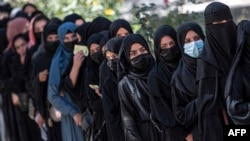Taliban authorities in Afghanistan reportedly have agreed to allow female students to pursue higher education in Pakistan, provided that their male guardians also are granted visas to accompany them, according to officials privy to the understanding.
The revelation comes as hundreds of Afghan students took entrance examinations on Saturday to secure admission to graduate, postgraduate and Ph.D. programs in Pakistani universities.
Officials reported that Afghan refugees living in Pakistan attended designated centers in the cities of Peshawar and Quetta to take their exams, while students in Afghanistan are scheduled to participate online over the next few days.
Mohammad Sadiq, Pakistan's special envoy for Afghanistan, announced in the lead-up to the tests that nearly 21,000 Afghan candidates, including more than 5,000 females, had submitted their applications for the upcoming summer academic sessions. His office reported “a significant turnout” of Afghan students at the designated test centers on Saturday but did not provide specific numbers.
The Higher Education Commission of Pakistan is conducting entrance tests to select up to 2,000 Afghan students, with one-third of the selected candidates being female.
Pakistan expressed its "profound gratitude" to the Kabul government “for agreeing to allow successful female candidates to pursue their education, provided that their mahrams [chaperones] are granted visas to accompany them,” said a government official in Islamabad, requesting anonymity due to a lack of authorization to discuss the matter publicly with the media.
The official stated that visas would be issued to chaperones “to allow them to accompany female students, as mandated by Afghan law,” to study in Pakistani institutions.
The Taliban did not immediately comment on Pakistani assertions that they would let Afghan girls pursue higher education in the neighboring country.
Pakistan offers fully funded scholarships to thousands of students from its war-ravaged, poverty-stricken neighbor. The program for female students was halted, however, after the hardline Taliban regained power in 2021 and banned girls’ education past the sixth grade. They also prohibited Afghan women from traveling or flying without a chaperone.
The Higher Education Commission website states that the scholarship program is designed to foster stronger ties with Afghanistan by providing high-quality education to Afghan students in diverse fields, including medicine, engineering, agriculture, management and computer science.
The entrance examinations for Afghan students come amid bilateral tensions that have escalated lately over allegations that anti-Pakistan armed groups are using Afghan territory to launch cross-border terrorist attacks. The Taliban deny claims of allowing or sheltering foreign militants that threaten neighboring countries.
After assuming office last month, Sadiq visited Afghanistan, where he held extensive talks with Taliban leaders on ways to stabilize bilateral political, security and trade cooperation. He described his meetings with de facto Afghan officials as productive but did not elaborate.
The envoy, while addressing a gathering of Afghan and Pakistani civil society and trade representatives in Islamabad this week, said the two countries are collaborating closely to reduce tensions and enhance economic ties and trade. In addition, he said they are trying to strengthen people-to-people connections through cooperation in education and other sectors.
Since sweeping back to power 3½ years ago, the Taliban have instituted sweeping restrictions on Afghan women, barring most of them from seeking public and private sector employment and requiring they cover their faces in public.
The United Nations has labeled the curbs as “gender apartheid” and persistently demanded their reversal. The Taliban defend their governance as being in line with Islamic law, or Sharia, and Afghan culture, rejecting criticism and calls for reversing their policies.




